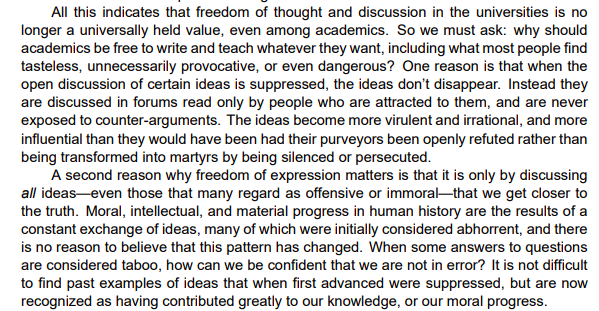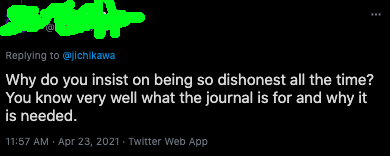This tweet seems to have hit a deeper nerve than I expected it to! I& #39;m even getting insulting replies to it my email; that kind of crossover engagement is pretty rare for me.
I& #39;ll take the occasion to explain what I meant a little bit more explicitly. Here& #39;s a thread. https://twitter.com/jichikawa/status/1385648293535830016">https://twitter.com/jichikawa...
I& #39;ll take the occasion to explain what I meant a little bit more explicitly. Here& #39;s a thread. https://twitter.com/jichikawa/status/1385648293535830016">https://twitter.com/jichikawa...
Let& #39;s start with making the subtweet, tweet, for the benefit of audiences not following along the academic philosophy hot topics of the day.
I was reacting to the new "Journal of Controversial Ideas". https://dailynous.com/2021/04/23/journal-of-controversial-ideas-publishes-inaugural-issue/">https://dailynous.com/2021/04/2...
I was reacting to the new "Journal of Controversial Ideas". https://dailynous.com/2021/04/23/journal-of-controversial-ideas-publishes-inaugural-issue/">https://dailynous.com/2021/04/2...
One of my central complaints about a lot of the discourse about free speech, platforming, cancel culture, etc., is that some participants are invoking inappropriately abstract considerations about very substantive and contingent matters.
People often give a defence of promoting a particular idea — that race predicts intelligence, say — in terms that are wholly general. "It& #39;s good to talk about whether race predicts intelligence, because the best ideas will win out in the marketplace of ideas." Something like that
These are abstract, all-purpose argument forms. Swap out the race–intelligence connection for literally any view and the argument will work in exactly the same way.
But very few people advocate for this kind of absolutism. Nor should they; some ideas are too repugnant, and too decisively refuted, to be considered legitimate.
(Obviously it& #39;s controversial WHICH are like that!)
(Obviously it& #39;s controversial WHICH are like that!)
But the fact that someone doesn& #39;t think it& #39;s good to question, for instance, whether the Holocaust was really all that bad, shows that an "all-purpose" argument for intellectual inclusion isn& #39;t really what& #39;s motivating them.
I have written about this kind of thing a lot before. Here& #39;s a 2019 thread about it in the context of transphobia. (I& #39;m linking to the middle of the thread, which is most explicitly on this point.) https://twitter.com/jichikawa/status/1135421866657497088">https://twitter.com/jichikawa...
Here was a pithier version of the point. https://twitter.com/jichikawa/status/1355959955614908416">https://twitter.com/jichikawa...
Wow I have been beating this drum a long time, here& #39;s a 2016 blog post I& #39;d forgotten about http://blog.jichikawa.net/2016/09/platforms-free-speech-and-boundaries-of.html">https://blog.jichikawa.net/2016/09/p...
Sorry for so many links. Some of my trolls accused me yesterday of being disingenuous about these matters, and that kinda hurt my feelings a bit. These are matters I& #39;ve thought a lot about for years.
I don& #39;t say this to claim expertise — I just insist on claiming sincerity.
I don& #39;t say this to claim expertise — I just insist on claiming sincerity.
OK let& #39;s come back to my tweet yesterday. (Sorry this thread is getting so long!) Here it is again. https://twitter.com/jichikawa/status/1385648293535830016">https://twitter.com/jichikawa...
The Journal of Controversial ideas is motivated by the perception that for some kinds of stances that an academic might wish to defend, the social cost of defending that stance is too high, creating a chilling effect. Let& #39;s grant for the purpose of argument that (1) this is so.
Let& #39;s also grant for the purpose of argument that (2) this chilling effect is bad — that, for the kind of social epistemic reasons the editors describe, it is important that defences of those positions be published.
(You can read the editors& #39; remarks along these lines here. https://journalofcontroversialideas.org/download/article/1/1/140/pdf)">https://journalofcontroversialideas.org/download/...
So I& #39;m granting for the purpose of argument that for a class of ideas X that this journal wishes to promote:
1) many academics who are inclined towards X ideas feel unsafe defending them publicly;
2) this is bad, because it would be better for X ideas to be defended publicly.
1) many academics who are inclined towards X ideas feel unsafe defending them publicly;
2) this is bad, because it would be better for X ideas to be defended publicly.
(For the record I think (1) is true, but I have doubts about (2), for many of the X& #39;s in question, but I& #39;m setting those doubts aside right now.)
Granting for the purpose of argument (1) and (2), we may ask: OK, what is the class of ideas X at issue?
And the point of my tweet yesterday was: it& #39;s not "controversial ideas". No philosophy journal seeks uncontroversial ideas—uncontroversial ideas aren& #39;t where research happens
And the point of my tweet yesterday was: it& #39;s not "controversial ideas". No philosophy journal seeks uncontroversial ideas—uncontroversial ideas aren& #39;t where research happens
This. https://twitter.com/PaulLFranco/status/1385718022506127360">https://twitter.com/PaulLFran...
What is distinctive about the views that people feel unsafe defending, to which (I& #39;m assuming) JCI is giving a valuable platform, is not that they are controversial. It is that they are perceived by many to oppose values of inclusiveness that are partyline standard in academia.
By branding the issue as one of "controversial ideas", the journal is doing a bit of propagandizing. The suggestion is that other academic journals are intolerant to controversial ideas. Making basic epistemic mistakes. They& #39;re pretending this isn& #39;t a deeply political project.
Ironically enough, this tweet in reply to mine got something importantly right, close to the core of my point. I do see what the journal is for: it is for expanding the space of legitimate positions to include more "anti-woke" ones. I object to their attempt to pretend otherwise.
I& #39;d have a lot more respect for the project if it were more straightforward about its political aims. The boundaries of respectful discourse is a deeply political question, and this journal is taking a controversial stance on it.
Which is fine. Political stances are fine. (I disagree with this one, but it& #39;s a legitimate stance.) It just bugs me when people pretend they& #39;re not taking one when they are, or that the people who disagree with them aren& #39;t similarly occupying a political stance.
I just find it deeply ironic that my remarks about this journal have provoked such a hostile, dismissive, insulting, and silencing response from its supporters, even while they explicitly advocate for the wider legitimization of discourse.
OK. Phew! That& #39;s enough for this thread for now. I hope everyone has a nice day!

 Read on Twitter
Read on Twitter



